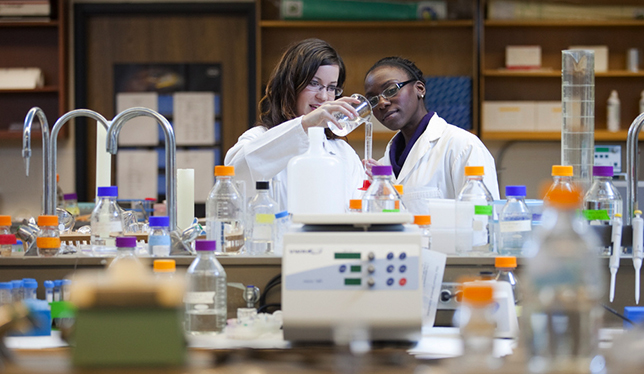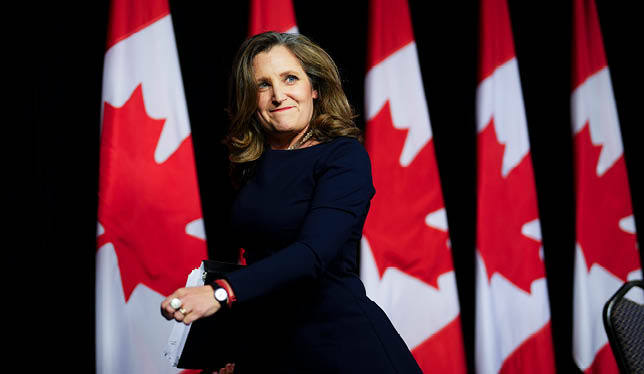Canada’s much-anticipated “supercluster” R&D groups unveiled
Federal funding of $950 million promised for the five winning bids from across the country.

The federal government revealed the recipients of a funding program to create “superclusters” – business-led partnerships between postsecondary institutions and the private sector meant to accelerate innovation in technology-related, high-growth research and development areas. Each of the winning teams will be given a portion of the program’s $950-million funding package.
Kirsty Duncan, minister of science, and Bardish Chagger, minister of small business and tourism, attended the announcement made by Navdeep Bains, minister of innovation, science and economic development, at the Science and Technology Museum in Ottawa on Thursday. Dr. Duncan referred to the superclusters as “legacy funding,” first introduced in the federal budget two years ago and increased in 2017 with the release of the Liberals’ “Innovation and Skills Plan.”
The superclusters were selected from a shortlist of nine, which had been whittled down from 50 applications.
The winners are:
- Ocean Supercluster (Atlantic Canada): Led by the Petroleum Research Newfoundland and Labrador with more than 110 partners, the project will focus on the sustainable development of Canada’s “ocean economy” with an eye to expanding its capacity. Partners work in a range of fields including aquaculture, maritime shipping and security, fisheries, clean energy, and offshore oil and gas. Dalhousie University and Memorial University are partners.
- AI Supercluster (Quebec): This group will use artificial intelligence and robotics to adapt global supply chains and exportation for the retail, manufacturing, construction and engineering sectors. The application was submitted by Optel, a Quebec-based multinational company dealing in international traceability systems. It has 110 partners including the University of Waterloo and Campus Montreal’s L’institut de valorisation des données (IVADO).
- Advanced Manufacturing Supercluster (Ontario): The application was submitted by Communitech Corporation and MaRS Discovery District, incubators based in Waterloo and Toronto, respectively. The consortium is interested in advancing manufacturing for the “factory of the future.” Its focus will include areas like advanced robotics, 3D printing and visioning systems for application in a range of industries including automotive and food. More than 130 partners, including the University of Waterloo, are involved.
- Digital Technology Supercluster (British Columbia): This team, which includes TELUS, the Research Universities’ Council of BC, the University Health Network, Microsoft and more than 270 partners, will focus on improving how Canada develops and delivers digital technology, as well as how big data is collected, analyzed and visualized. It will look to specifically work with the healthcare, forestry and manufacturing sectors.
- Protein Industries Supercluster (Prairies): The “pan-Prairie” consortium will build off Canada’s success as a leading exporter of canola and pulse crops to become a leading supplier of plant-based proteins, foods and other related products. Partners, which include Ag-West Bio Inc., the University of Saskatchewan, Dow DuPont Agriculture, Maple Leaf Foods and more than 100 others, will develop new technologies in plant science to create higher quality seeds, crops and processing methods.
Minister Bains called the superclusters the equivalent of a “made-in-Canada Silicon Valley” that will create 50,000 jobs. He said that the investment would ultimately “add billions to our GDP” and put Canada “front and centre in the global innovation race.”
A panel discussion with a representative from each supercluster followed the announcement. Several speakers commented on how the supercluster initiative will significantly impact the postsecondary sector. Not only will it lead to more funding for targeted research, it will lead to new opportunities for researchers to bring their work to the market and for students to get hands-on experience in the private sector, they said. Linda Hasenfratz, CEO of the Linamar Corporation and a spokesperson for the Advanced Manufacturing Supercluster, addressed the experiential education possibilities, noting that “100 percent of students” should get this kind of opportunity. “That’s what’s going to bring us [academia and business] closer together.”
Alan Clarke, chief executive officer Petroleum Research Newfoundland and Labrador, said that a long-term benefit will be the new education and training programs and curricula that will come out of the superclusters.
Minister Bains noted the supercluster initiative not only contributes to the federal government’s “innovation agenda” but also to its so-called diversity and inclusion agenda. During the application process, applicants were asked to consider how they would engage women and underrepresented groups as part of their talent pool. “Its not only the right thing to do, its good for the bottom line,” Minister Bains said. “If we want innovation to succeed … [it] has to benefit the many, not just the few.”
Bill Tam, co-chair of the Digital Technology Supercluster and past-president of BC Tech, said an inclusion mandate had been built into his consortium’s guiding principles, charters, governance structure and recruitment strategies. He said one way the group will measure its success in this area – including how well it’s faring in representation from urban and rural communities, and from Indigenous communities – is by employing “performance scorecards.” Tristan Mallet, interim CEO of the SCALE.AI Supercluster, responded in French that his group had started with a diverse founding team from the very beginning.
Speakers also made the point that the superclusters are just getting started, and their teams and activities are not set in stone. Mr. Clarke said that the technology required for the Ocean Supercluster’s initiative alone will require new partners to get on board. “We’ll be reaching out to get the technology we need,” he said.
In a statement from U of Waterloo, a partner in two superclusters, dean of engineering Pearl Sullivan noted that both groups will work in the fields of artificial intelligence, robotics, autonomous systems, big data analytics, mobile technologies, and the Internet of Things. “We are well known as a dynamic hub for research, talent and team development, industry collaborations and start-up activity in all of these areas and are excited to shape Canada’s connected economy,” she said.
While a few universities and individual faculties have already joined as partners in the superclusters, Universities Canada president Paul Davidson signalled that many more are prepared to get involved. “Universities play a crucial role in building Canada’s innovation capacity, and our members across the country look forward to being key partners in these superclusters to help drive innovation and growth in our changing global economy,” he said. “The new superclusters offer a collaborative way to build ambitious new partnerships between the private sector and our institutions, bringing the expertise, skills, and discoveries of university researchers and students to the maximum benefit of Canadians.”
David A. Wolfe, co-director of the Innovation Policy Lab in the Munk School of Global Affairs at the University of Toronto, said the federal superclusters program “provides much needed balance for the performance of different elements in Canada’s national innovation system. It builds on existing research strengths in the higher education sector and public research institutions but adopts a firm-led approach to developing the next generation of innovative technologies that are essential for future job creation in Canada.”
Federal funding for the superclusters program has been guaranteed over five years. Each consortium must match the federal investment dollar-for-dollar.
Featured Jobs
- Business – Lecturer or Assistant Professor, 2-year term (Strategic Management) McMaster University
- Veterinary Medicine - Faculty Position (Large Animal Internal Medicine) University of Saskatchewan
- Education - (2) Assistant or Associate Professors, Teaching Scholars (Educational Leadership)Western University
- Psychology - Assistant Professor (Speech-Language Pathology)University of Victoria
- Canada Excellence Research Chair in Computational Social Science, AI, and Democracy (Associate or Full Professor)McGill University
















Post a comment
University Affairs moderates all comments according to the following guidelines. If approved, comments generally appear within one business day. We may republish particularly insightful remarks in our print edition or elsewhere.